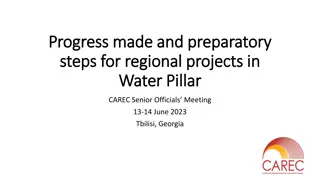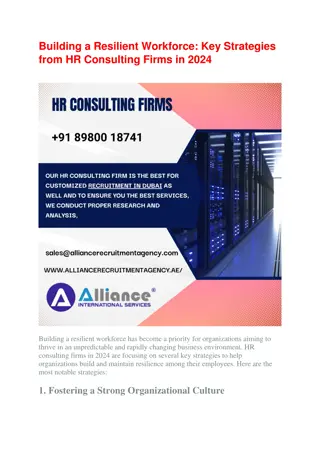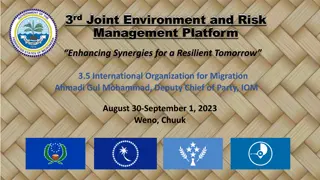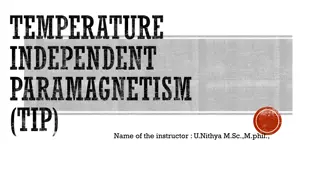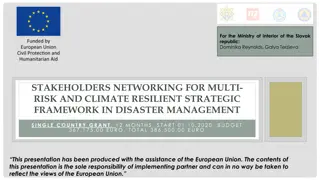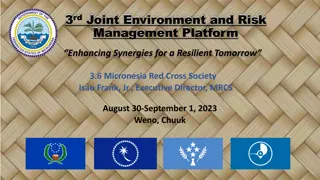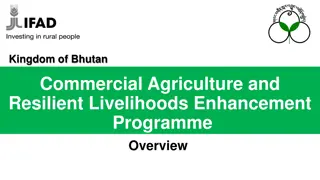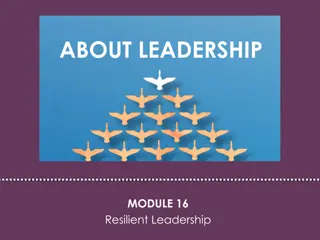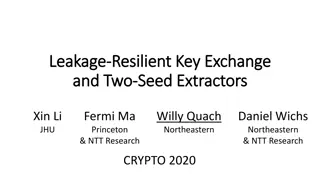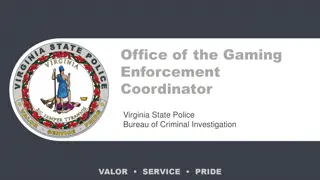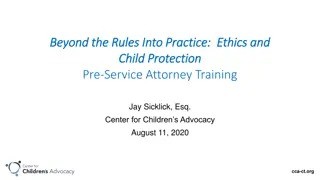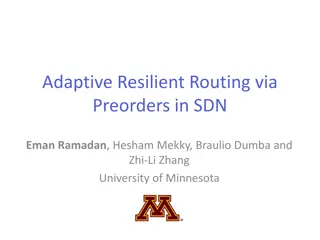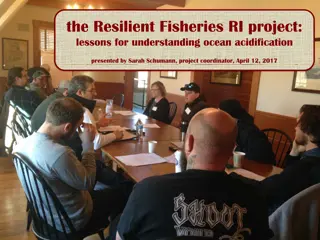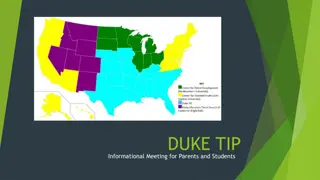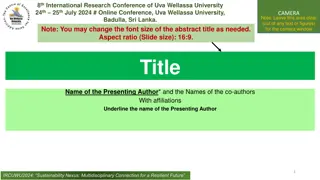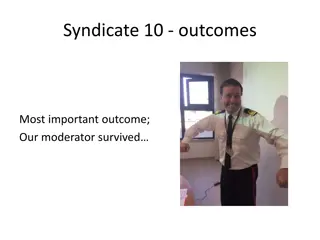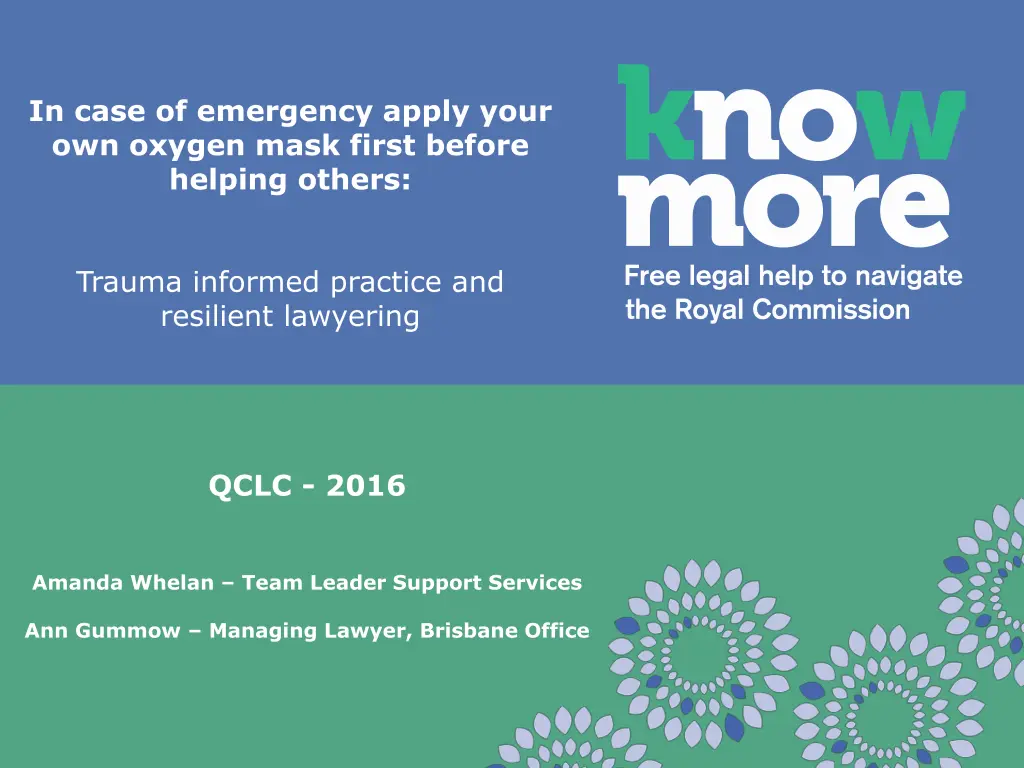
Trauma-Informed Practice and Resilient Lawyering at QCLC
Explore trauma-informed practice and resilient lawyering at QCLC, focusing on self-care, wellbeing, and approaches to supporting vulnerable client groups. Learn about the knowmore legal service, its multidisciplinary model, and the importance of cultural security in client support. Dive into the model's key components and how it adapts to complex client needs, highlighting the significance of learning from experience and sector expertise.
Uploaded on | 1 Views
Download Presentation

Please find below an Image/Link to download the presentation.
The content on the website is provided AS IS for your information and personal use only. It may not be sold, licensed, or shared on other websites without obtaining consent from the author. If you encounter any issues during the download, it is possible that the publisher has removed the file from their server.
You are allowed to download the files provided on this website for personal or commercial use, subject to the condition that they are used lawfully. All files are the property of their respective owners.
The content on the website is provided AS IS for your information and personal use only. It may not be sold, licensed, or shared on other websites without obtaining consent from the author.
E N D
Presentation Transcript
In case of emergency apply your own oxygen mask first before helping others: Trauma informed practice and resilient lawyering QCLC - 2016 Amanda Whelan Team Leader Support Services Ann Gummow Managing Lawyer, Brisbane Office
Acknowledgement of Country We acknowledge the Traditional Owners on whose land we meet, and Elders past, present and future
Introductions Ann and Amanda Acknowledge our clients and their stories as being at the heart of what we do. knowmore was founded in close consultation with survivor groups; this is another example of the CLC s learning from their clients (James Farrell) Here today however to talk more about approaches to the work and our own wellbeing, self care and resilience LOTS of great material and work out there on these topics, these are some of knowmore s favourites, we encourage you to explore your own!
Todays Webinar Part 1: knowmore Legal Service Part 2: Trauma Informed Practice Part 3: Impacts Of The Work Part 4: Wellbeing and Resilience Part 5: Reflections/question
Part 1 knowmore legal service
About knowmore Context - the Royal Commission into Institutional Responses to Child Sexual Abuse and knowmore legal service A program of NACLC, funded by the Australian Government through AGD Multidisciplinary model of lawyers, Aboriginal and Torres Strait Islander Engagement Advisors, Social Work/counsellors (and administration team) For more information about us www.knowmore.org.au
knowmores model Trauma-informed, person-centred, culturally secure practice framework seen as key to supporting a very vulnerable client group (whose complex needs were acknowledged in establishing the service) It is important to acknowledge that knowmore was resourced appropriately by the AG through the funding agreement to provide this model knowmore s model seeks to learn from other multidisciplinary service approaches that have supported this client group over time, and from the vast experience of the CLC sector in doing the same
Some data As of September 30th 2016: Knowmore provided 44,520 legal advices to 5,565 clients; 61% were over the age of 45; 59% were male and 41% were female; 21% identified as Aboriginal and/or Torres Strait Islander 62% of these clients received Support Services Team support and 49% were referred to other support services
Part 2 Trauma Informed Practice
What do we mean by Trauma-informed practice? Recognises the enduring impact of complex trauma and sees people s behaviours and impacts as responses to trauma instead of a pathology. It also recognises that recovery is possible, and that people may move in and out of wellness. Doesn t ask what s wrong? with a person but what s happened? to them. Triggers can occur at any stage in the process, and may not always seem obvious; what triggers one person another will step through without issue.
What do we mean by Trauma-informed practice? (cont..) Practice Guidelines for TIP ask us to think about how we create the following for the people we work with (and ourselves!) http://www.blueknot.org.au/ Safety Trustworthiness Choice Collaboration Empowerment Trauma informed practice needs to exist in ALL levels of the work; first and foremost with clients, but also across teams and in organisations/services if it is to be truly effective Question: WHY?
What do we mean by Trauma-informed practice? (cont..) Trauma informed practice needs to exist in ALL levels of the work; first and foremost with clients, but also across teams and in organisations/services if it is to be truly effective Question: Why does it need to exist at all levels to be effective? How does that help clients? Question: Why is TIP so important in CLC work? http://www.blueknot.org.au/Portals/2/Reports%20and%20Docs/ Legal%20and%20Justice%20Background%20Paper%20with%20 Abstract%20FINAL.pdf
WHY trauma informed practice? knowmore s example TI approaches are recognised as leading best practice responses to victims and survivors of child abuse and complex trauma They have been extensively implemented across the Royal Commission processes and DSS-funded support services, so consistency in approach was seen as crucial for knowmore when working with a common client group knowmore consulted with survivors groups when being established, all of whom said this was important Our core business is working with clients who have experienced trauma, and talking about their abuse is highly likely to trigger them, and to have flow on impacts for staff. HARM MINIMISATION was critical
HOW did/do we implement and sustain trauma informed practice? knowmore s example Built it into our model and our structure Its in our HR and recruitment processes Compulsory PD for all staff http://www.blueknot.org.au/Portals/2/Workshop%20Descriptions/In- house%20Training%20Booklet.pdf
HOW did/do we implement and sustain trauma informed practice? knowmore s example cont An Integrated Reflective Practice Framework which includes: Individual and group supervision Professional Development opportunities Team meetings Twice yearly all of staff gatherings Employee Assistance Program
Integrated Reflective Practice Leering, Michele. "Conceptualizing Reflective Practice for Legal Professionals." Journal of Law and Social Policy 23. (2014): 83-106. http://digitalcommons.osgoode.yorku.ca/jlsp/vol23/iss1/5
Trauma informed practice and organisational culture All of what we have talked about is all really great in theory, policy etc but for it to have proper meaning it HAS to exist in your culture!! Question: What role does leadership play in supporting trauma- informed practice and self care?
Part 3 Impacts of the work
Good news! Youre not a psychopath!! Vicarious Trauma and Burnout Working safely with survivors of trauma involves accepting that this work is emotionally strenuous and involves the unavoidable risk of vicarious trauma VT is also referred to as: burn out , secondary trauma , feeling heavy or compassion fatigue https://aifs.gov.au/publications/feeling-heavy/what-vicarious-trauma
Good news! Youre not a psychopath!! Vicarious Trauma and Burnout cont.. Deliberate acts of harm by one human against another are usually the most disturbing VT and burnout are a NORMAL consequence of being an empathic being i.e. Teams catch the moods of their clients, and they catch the impacts of their colleagues http://www.lawcover.com.au/wp-content/uploads/2015/09/3324- The-Resilient-Lawyer_V7.pdf Question: What are some of the common signs of burnout or vicarious trauma that you see in yourself or others?
Part 4 Wellbeing and Resilience
Wellbeing: apply mask to self first before helping others We are our key tool in the work, so its important we look after ourselves so we can work to maximum effectiveness with others (the oxygen mask idea) Staying well in the work will look different for everyone Queensland Law Society has great Fact Sheets on the Culture of the Legal Profession, Optimal Functioning and Seeking Help check them out!! http://www.qls.com.au/For_the_profession/Love_Law_Live_Life
The Resilient Lawyer: The work of Robyn Bradey The general meaning of resilience is derived from it s Latin roots to jump or leap back which is the ability to recover from or adjust easily to misfortune, adversity or change Things that can promote resilience include: Staying connected to the bigger picture Supportive relationships (in work and outside) A break from certain kinds of matters so you can recharge http://www.lawcover.com.au/wp-content/uploads/2015/09/3324-The- Resilient-Lawyer_V7.pdf Have a look also at the great resources that Queensland Law Society has!! http://www.qls.com.au/For_the_profession/Love_Law_Live_Life
The Resilient Lawyer: The work of Robyn Bradey cont Things the workplace can do: Recognise and validate impacts for staff of the work; Provide supervisions, mentoring and counselling; Provide PD; Celebrate skills and successes; Value the work, the worker and the clients; Manage workloads; Enforce holidays and breaks; Allow for rotation in duties .. http://www.lawcover.com.au/wp-content/uploads/2015/09/3324-The-Resilient- Lawyer_V7.pdf
Self care planning what does your wheel look like?
Some final thoughts Stay connected to work that feels meaningful for you Plan your holidays Have an exit strategy in mind (you don t HAVE to do this work) Never underestimate the power of humour!! (or wine, or chocolate . )
Part 5 Any reflections or questions for us? THANK YOU!!
Contact Us More than happy to help with any questions that you may have now or in future! Ann Gummow Managing Lawyer 07 3218 4500 ann.gummow@knowmore.org.au Amanda Whelan Team Leader, Support Services 07 3218 4500 amanda.whelan@knowmore.org.au FREECALL Web: www.knowmore.org.au 1800 605 762

